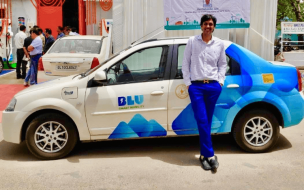Bhakti Nagavekar, a current MBA student, says that Aston's focus on each candidates' specific goals convinced her to apply.
Initially training as a software engineer, Bhakti transitioned into management consulting for six years and eventually established her own firm. She then decided that an MBA would give her the holistic perspective she required to progress in her career.
"When you come from a specialized degree, you're pigeonholed into that subject area. As a management consultant, however, you're expected to go into any business and understand the workings of that industry," Bhakti explains.
"I started my own company, and realized I needed to see the 'big picture' when contributing to my clients' goals. I recognized that I could learn how to solve problems in different industries through an MBA."
Integrated within the Aston MBA program is a career and personal development module—the Aston Edge. At the core of this module is a candidate-centered approach in preparing students to accomplish their career aspirations.
"As part of Aston Edge, experienced career development professionals go through your profile, conduct interviews, and then suggest flexible elective modules for you to complete throughout the year," Bhakti says. "These modules involve reflecting on your professional path, and mapping out your career journey."
Bhakti notes representatives of diverse industries are invited by the school to speak to its MBA students. This is made possible by Aston's well-entrenched connections and expansive alumni network.
"We have the opportunity to speak with senior executives, understand their experiences, and learn about current trends in the industries they work in,” she says.
"I'm currently working with Chiltern Railways on their digital transformation plan for my consultancy project. This is an opportunity I got through Aston's network.
"The project has allowed me a lot of flexibility, and a sense of control over my career. It's amazing that I can help the company's strategy through my MBA."
Visits to company sites further provide students with networking opportunities. This year, Aston's MBA students travelled to Toulouse in France, and visited the headquarters of Airbus.
"It was interesting to see how MBA students can progress into such different areas, like aviation," Bhakti says. "Aston's industry connections and study trips reaffirm the practicality of the program. What students learn is in line with what's going on in these industries, rather than theory that stays the same over many years."
Bhakti adds that the school also organizes trips to other business schools. This enables MBA students to connect with peers elsewhere. Participating in competitions at these schools also allows them to interact with investors.
What’s next? Bhakti plans to move country post-MBA and work in financial services in a strategic management role.
"The opportunities offered by the program are vast," Bhakti says. "It's about where you want to go in your career, and working out how to get there. At end of the day, the effort you put into the Aston MBA will determine how much you get out of the degree."






